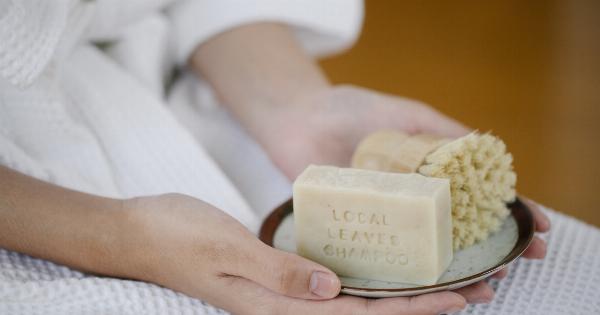When you’re pregnant, ensuring the health and well-being of your unborn baby becomes a top priority. From making dietary changes to avoiding potentially harmful substances, expectant mothers take every precaution to protect their little ones.
One area that has garnered increasing attention in recent years is the use of antibacterial soaps. While these products may seem like a good idea for maintaining cleanliness, numerous studies have shown that they may pose several risks to your developing baby. Let’s explore why antibacterial soaps may do more harm than good during pregnancy.
1. Presence of Harmful Chemicals
Many antibacterial soaps contain chemicals such as triclosan and triclocarban, which act as antimicrobial agents. These substances are known endocrine disruptors, meaning they interfere with the normal functioning of hormones in the body.
Several studies have linked exposure to these chemicals during pregnancy with adverse developmental effects.
2. Disruption of Hormonal Balance
Hormones play a crucial role in the development of a fetus. Any disruptions to the delicate hormonal balance can have far-reaching consequences.
Research has suggested that triclosan and triclocarban interfere with hormone regulation, particularly the thyroid hormone, which is crucial for brain development in the fetus. Even low levels of exposure to these chemicals can cause subtle but significant changes in the developing baby’s neurodevelopmental processes.
3. Potential Developmental Disorders
Exposure to antibacterial soap chemicals during pregnancy has been associated with an increased risk of developmental disorders in children.
Studies have shown that children exposed to triclosan and triclocarban in utero are more likely to experience cognitive impairments, behavioral issues, and even developmental delays. These effects can persist long after birth and may have long-term consequences on a child’s overall well-being.
4. Weakening of the Immune System
Contrary to popular belief, using antibacterial soaps excessively can actually weaken the immune system. Our immune systems need exposure to various microbes to develop and function properly.
Overuse of antibacterial soaps can disrupt the natural balance of bacteria on the skin and lead to a weakened immune response. This poses a greater risk to pregnant women, as a compromised immune system can make them more susceptible to infections that may harm both the mother and the developing fetus.
5. Antibiotic Resistance
The widespread use of antibacterial soaps contributes to the growing problem of antibiotic resistance. Antibiotic resistance occurs when bacteria adapt and become immune to the effects of antimicrobial agents.
This can render antibiotics ineffective when they are genuinely needed to treat infections during pregnancy or after childbirth. By avoiding antibacterial soaps, you can help minimize the development of antibiotic-resistant bacteria and protect yourself and your baby from potential harm.
6. Skin Irritation and Allergies
Pregnancy can make your skin more sensitive, and using antibacterial soaps that contain harsh ingredients can lead to skin irritation and allergies.
These products often include fragrances and preservatives that can trigger allergic reactions and worsen existing skin conditions. It’s crucial to prioritize gentle, hypoallergenic cleansers during pregnancy to minimize the risk of adverse skin reactions.
7. Negative Environmental Impact
Aside from the potential harm to your baby, antibacterial soaps also pose a threat to the environment. When these products are washed down the drain, they enter waterways and can negatively affect aquatic ecosystems.
The chemicals in these soaps can accumulate in the environment, disrupt the balance of natural microbial communities, and harm fish and other aquatic organisms. By choosing alternative soap options during pregnancy, you can contribute to a healthier environment for future generations.
8. Safer Alternatives
Fortunately, there are several safer alternatives to antibacterial soaps that can effectively keep you clean and healthy during pregnancy. Opt for regular soap and water, particularly mild and fragrance-free varieties, to cleanse your hands and body.
Washing your hands thoroughly and frequently is one of the most effective ways to prevent the spread of germs and infections. Additionally, using hand sanitizers that do not contain harmful chemicals is another safe option when soap and water are not readily available.
9. Tips for a Healthy Pregnancy
Avoiding antibacterial soaps is just one of the many steps you can take to ensure a healthy pregnancy. Here are a few additional tips:.
• Maintain a balanced, nutritious diet rich in fresh fruits, vegetables, and whole grains to provide essential nutrients to your baby.
• Stay physically active with exercises approved by your healthcare provider to support your overall well-being and prepare your body for childbirth.
• Get plenty of rest and prioritize sleep to allow your body to recover and promote optimal fetal development.
• Stay hydrated by drinking an adequate amount of water throughout the day to support your body’s functions and prevent dehydration.
• Minimize stress by engaging in relaxation techniques such as yoga, meditation, and deep breathing exercises.
10. Conclusion
While it’s natural to want to protect your unborn baby from harmful bacteria, using antibacterial soaps may do more harm than good.
The presence of harmful chemicals, disruption of hormonal balance, potential developmental disorders, weakened immune system, antibiotic resistance, skin irritation, negative environmental impact, and the availability of safer alternatives all highlight the need to avoid antibacterial soaps during pregnancy. By making informed choices and prioritizing your baby’s well-being, you can navigate your pregnancy journey with confidence and peace of mind.































